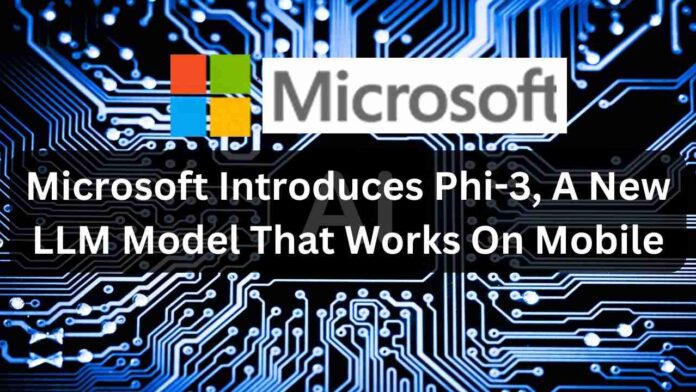Microsoft has recently introduced Phi-3-Mini, a groundbreaking language model designed to run on mobile phones. Let’s explore the key features and capabilities of Phi-3, along with its variants, in a simplified manner.
Introducing Phi-3 Models
Table of Contents
| Model | Parameters | Capabilities |
|---|---|---|
| Phi-3-Mini | 3.8 billion | Compact, suitable for mobile deployment |
| Phi-3-Small | 7 billion | Enhanced multilingual tokenization, improved performance |
| Phi-3-Medium | Customizable | High versatility and adaptability |
Phi-3-Mini: Power in a Compact Package
Phi-3-Mini, despite its small size, boasts impressive performance comparable to larger models like Mixtral 8x7B and GPT-3.5. Here’s what you need to know:
- Compact Size: Occupies only 1.8GB of memory, making it ideal for mobile phones.
- Performance: Achieves 69% on the MMLU benchmark and 8.38 on the MT-bench, suitable for mobile deployment.
- Offline Capability: Can run fully offline on devices like the iPhone 14, achieving more than 12 tokens per second.
Phi-3-Small: Enhanced Multilingual Capabilities
Phi-3-Small is equipped with advanced features for improved multilingual tokenization and performance:
- Parameters: 7 billion parameters for enhanced performance.
- Tokenization: Utilizes the tiktoken tokenizer for superior multilingual tokenization.
- Performance: Outperforms competitors like Meta’s Llama 3 8B Instruct with an impressive MMLU score of 75.3.
How to send video notes on Instagram
Addressing Limitations
While Phi-3 models demonstrate remarkable language understanding, they do have limitations:
- Storage Limitations: Unable to store extensive factual knowledge, impacting performance on certain tasks like TriviaQA.
- Language Restriction: Language capabilities are primarily restricted to English, with potential for exploration in multilingual capabilities.
Phi-3-Medium, the most customizable variant, offers unparalleled versatility:
- Customization: Tailor the model to specific tasks or applications.
- Scalability: Adjust parameters and architecture as needed for optimal performance.
- Adaptability: Seamlessly integrate with various platforms and environments.
Future Prospects and Enhancements
Microsoft is committed to further enhancing Phi-3 models and exploring new possibilities:
- Augmentation with Search Engine: Addressing limitations by integrating with a search engine for comprehensive knowledge access.
- Multilingual Exploration: Investing in multilingual capabilities to broaden language support beyond English.
Future Directions
Looking ahead, Microsoft aims to address the limitations of Phi-3 models and further expand their capabilities:
- Enhanced Knowledge Integration: Integration with search engines to bolster factual knowledge access.
- Multilingual Advancements: Continued research into multilingual capabilities to broaden language support.
- Community Collaboration: Engaging with developers and researchers to refine and optimize Phi-3 models for diverse applications.
With these initiatives, Microsoft is poised to continue leading the way in mobile AI, empowering users with cutting-edge language processing capabilities right at their fingertips.
Get Started with Phi-3
Explore the possibilities of Phi-3 models today and discover the next generation of mobile language processing. Whether you’re a developer seeking to integrate AI into your app or a user looking for powerful language assistance, Phi-3 has something to offer for everyone.
Don’t miss out on the opportunity to harness the power of Phi-3 and unlock new realms of productivity and innovation in the palm of your hand. Get started with Phi-3 today and experience the future of mobile AI with Microsoft.
In summary, Microsoft’s Phi-3 models mark a significant milestone in mobile language processing. With Phi-3-Mini’s compact size, Phi-3-Small’s multilingual prowess, and Phi-3-Medium’s customizability, users have access to powerful language models tailored to their needs. While there are limitations, Microsoft’s ongoing efforts to innovate and enhance Phi-3 models promise exciting prospects for the future of mobile AI.
FAQ Microsoft Phi-3
Q.1: How does Phi-3-Mini compare to larger models?
Ans: Despite its smaller size, Phi-3-Mini delivers comparable performance to larger models, making it suitable for mobile deployment.
Q.2: Can Phi-3-Small handle multilingual tasks?
Ans: Yes, Phi-3-Small utilizes advanced tokenization techniques for enhanced multilingual performance.
Q.3: What are the limitations of Phi-3 models?
Ans: Phi-3 models may struggle with storing extensive factual knowledge and have limited language capabilities beyond English.



